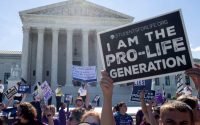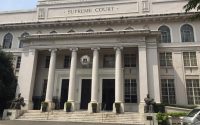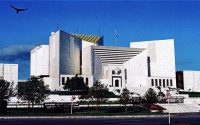Rajeev Dhavan arguing in Ayodhya Case: Live Updates from Supreme Court [Day 17]
Source: barandbench.com
The hearing in the Ayodhya case is progressing at the Supreme Court of India.
The Ayodhya case is being heard by a Constitution Bench of Chief Justice of India Ranjan Gogoi and Justices SA Bobde, DY Chandrachud, Ashok Bhushan and Abdul Nazeer.
Hearings had commenced on August 6, with arguments being made on behalf of the Nirmohi Akhara. In the following hearings, submissions were also made on behalf of the deity Ram Lalla and the Ram Janmabhoomi Punaruddhar Samiti. After arguments on behalf of the Hindu parties to the Ayodhya dispute concluded, arguments have commenced on behalf of the Muslim parties to the case.
Read an account of Day 1 of the arguments here. Accounts of the arguments made on Days 2 and 3 can be read here and here. Arguments made on Day 5 can be read here.
Day 6 arguments can be read here and Day 7 arguments can be read here. Day 8 arguments can be read here. Day 9 arguments can be read here. Day 10 arguments can be read here. An account of day 15 arguments can be read here and an account of day 16 arguments can be read here.
Below are live updates from today’s hearing in the Ayodhya case:
- The muslim parties commence their arguments in Ayodhya case today.
- Senior Advocates Kapil Sibal mentions application for contempt filed by Senior Advocate Rajeev Dhavan on the threat received by Dhavan for appearing for Muslim parties to the Ayodhya dispute. CJI Ranjan Gogoi agrees to list it tomorrow.
- Rajeev Dhavan apologises to Bench for comments in media and to Senior Advocate PN Mishra. “It is universally recognised that I can be irritating“, says Dhavan.
- Senior Advocate Dhavan commences arguments for muslim parties.
- What is the law that Your Lordships has inherited? The law we follow is not Vedic law. Your Lordships’ legal system starts in 1858, Rajeev Dhavan.
- What is the degree of reliance that we can place on Historians, Rajeev Dhavan.
- “Let me start with the issue of what law this Court should apply? Should we apply Vedas, Skand puran?“, Rajeev Dhavan.
- Parikrama is a form of worship, not evidence, Rajeev Dhavan.
- “They spoke about this invasion and that invasion. I dont want to go into that. Was there an Aryan invasion?“, says Dhavan discarding the invasion arguments.
- None of them from the other side referred to facts of the cases they cited except Ranjit Kumar, submits Rajeev Dhavan.
- Rajeev Dhavan also refers to certain submissions by K Parasaran. While stating that he respects him a lot and he is “as Your Lordships say Bhishma Pitamah, it is for Your Lordships to decide at the end whether he was on the right side or not”, Dhavan.
- Do you want me to start from 1858 or do you want me to go back to 1528? asks Rajeev Dhavan. If Your Lordships want me to go back to 1528, I can show document after document to prove that a mosque existed there, Dhavan.
- Rajeev Dhavan arguing on the law to be applied in the event of change of sovereign.
- Rajeev Dhavan referring to case laws on what law is to be applied.
- The ‘regime-change argument’ was made for 1.5 days. So I have to argue on that point of what law has to be applied, Rajeev Dhavan.
- “As far as a title suit of civil nature is concerned, there is no room for historical claims“, Dhavan reads our from a judgment. Non-use of property by the owner for a long time wont affect his title, Dhavan.
- Justice Agarwal of Allahabad HC decided to give his judgment on the basis of conjectures and prepondarance of probabilities. The entire secular structure of our Constitution will disappear if we try a balancing act between apples and oranges, Dhavan.
- We are firmly of the view just because there was a peacock or lotus there does not mean there was a massive structure before the mosque, Dhavan.
- The question formulated for Archeological Survey of India (ASI) was whether there was a temple which was demolished for construction of mosque, Dhavan.
- Dhavan on argument by Hindu parties that travellers of that time did not mention about the mosque: “Can negative inferences be made on that basis? Marco Polo did not mention about Great Wall of China“, Dhavan.
- We cannot play amateur historians in this case and we are all amateurs, Dhavan.
- “But you have also relied on historical submissions. It is something both sides have relied on“, Justice DY Chandrachud to Rajeev Dhavan.
- Your Lordship is right. What undercuts them undercuts me, Rajeev Dhavan.
- Mohammaden law relating to Trusts differs fundamentally from the English law, Rajeev Dhavan.
- Once it is declared that a particular property is Waqf/ dedicated to Waqf, then ownership is transferred to Almighty, Rajeev Dhavan.
- Rajeev Dhavan reciting Sanskrit verses and praising the beauty of Sanrkit language.
- “I am not saying idol worship is not important“, Rajeev Dhavan rebutting arguments of Hindu parties on ‘Swayambhu’.
- In 1934, it was damaged. In 1949, tresspass was committed and in 1992 it was brought down. After all that, they say Hindu Right must be protected, Rajeev Dhavan.
- One of their arguments is that after 1950, their right became crystallised under Article 13; I should respond to it, Rajeev Dhavan.
- Bench rises for lunch, hearing to continue at 2 pm.
Post Lunch Session
- Hearing resumes. Dhavan responding to arguments by Hindu parties on Article 13.
- Dhavan relying on Constituent Assembly Debates on Preamble and secularism in Constitution of India.
- Suggestions to have Preamble referring to God, Almighty were shot down, Dhavan.
- A claim was made that the right is in realm of public law. When asked what about Muslim law it was replied that it is only Hindu law. It was said they (muslims) were invaders and dont recognise their law after 1950, recognise only Hindu law, Dhavan
- I am citing Constituent Assembly Debates on secualrism because such arguments as above should not have taken place before this court, Dhavan.
- Rajeev Dhavan now arguing on whether the site is ‘res nullius’.
- Rajeev Dhavan’s arguments peppered with trivia on history, langauage etc.
- No temple or monastic institution existed during Vedic age; there was no idol worship during Vedic times, Rajeev Dhavan.
- One view is that these institutions came into existence during Buddhist period; but difficult to say exactly when idol worship started, Dhavan.
- Bench rises for the day.



